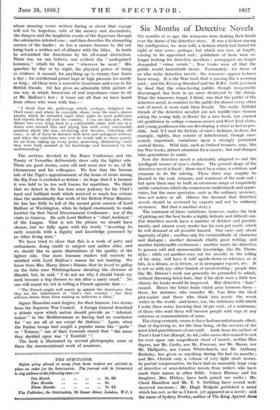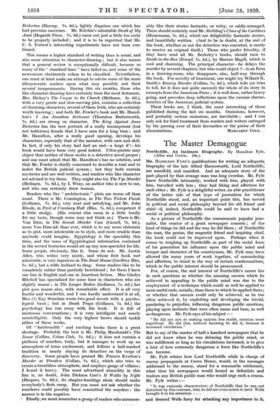Six Months of Detective Novels
Six months or so ago, the wiseacres were shaking their heads over the doom of the detective story. It was a fashion among the intelligentsia, we were told, a fashion which had lasted for eight or nine years, perhaps, but which was now, at length, coming to its appointed end ; publishers of taste were no longer looking for detective novelists ; newspapers no longer demanded "crime serials ; War books were all that the public would henceforth desire. Fortunately—for those of us who write detective novels—the wiseacres appear to have been wrong. It is the War book that is passing like a morning mist ; and the Evening Standard and the B.B.C. both proclaim by deed that the crime-loving public, though temporarily discouraged, has been in no sense destroyed by the slump. What the wiseacres forgot, I think, was that the public of the detective novel, in contrast to the public for almost every other sort of novel, is more male than female. The really faithful friends of the detective novelist are not middle-class women asking the young lady in Boots' for a nice book, but crusted old gentlemen in college common-rooms and West End clubs, and young gentlemen who are developing a crust as fast as pos- sible. And, if I read the history of men's fashions, in dress, for example, rightly, they consist of infinitesimal, - though enor- mously important, variations upon a strongly persistent central theme. Wild fads, such as Oxford trousers, may, like the War books, attract attention for a season; but real changes take generations to make.
Now the detective novel is admirably adapted to suit the intelligent wearer of men's clothes. The general shape of the detective novel is fixed ; there must be a crime, a solution, and someone to do the solving. These three may roughly be likened to the coat, trousers, and waistcoat of the male suit ; but upon them may be built an enormous range of exquisitely subtle variations which the connoisseur understands and appre- ciates, but the mere spectator, such as the ordinary reviewer, does not notice at all. (Hence the demand that detective novels should be reviewed by experts and not by ordinary reviewers. But that is another story.) The existence of these variations, however, makes the task of picking out the best books a highly delicate and difficult one. For detective novels have a number of distinct and possible merits, and almost every reader has his own pet merit, which he will demand at all possible hazard. One cares only about ingenuity of plot ; another only for verisimilitude of character and dialogue ; another demands chiefly good writing, and another hairbreadth excitement ; another wants his detective to possess odd and unreasonable knowledge, like Dr. Thorn- dyke ; while yet another cries out for novelty in the telling of his story, will have it told upside-down or sideways or in bits, in a dream, or in letters, or in newspaper reports, etc. It is not so with any other branch of novel-writing ; people who like Mr. Dreiser's work can generally be persuaded to admit, without throwing brick-bats, that if his style were a little less clumsy his books would be improved. But detective " fans " cannot. Hence the bitter feuds which arise between them— those, for instance, who consider Mr. Van Dine the ideal plot-maker and those who think him nearly the worst writer in the world—and hence, too, the dididence with which I write these notes, knowing that 50 per cent., at a minimum, of those who read them will become purple with rage at any criticism or commendation of mine.
The slump certainly seems to have had oneunfortunate effect, that of depriving us, for the time being, of the services of the most tried practitioners of our craft. Aside from the author of Trent's Last Case (Knopf, as. 6d.) who seems determined to rest for ever upon one magnificent sheaf of laurels, neither Miss Sayers, nor Mr. Crofts, nor Mr. Freeman, nor Mr. Mason, nor Mr. Phillpotts, nor Canon Whitechurch, nor Mr. Anthony Berkeley, has given us anything during the last six months ; and Mrs. Christie only a volume of very light short stories. In partial compensation, we have had an unusually large crop of detective or semi-detective novels from writers who have made their names in other fields. Canon Hannay and his daughter, Mrs. Hickey, have both joined our ranks ; Mr. Claud Hamilton and Mr. T. S. Stribling have scored well- deserved successes ; Mr. Hugh Walpole published a serial which has not, as far as I know, yet appeared as a novel ; and the name of Sydney Fowler, author of The King Against Anne Bickerton (Harrap, 7s. 6d.), lightly disguises one which has had previous successes. Mr. Kitchin's admirable Death of My Aunt (Hogarth Press, 7s. 6d.) came out just a little too early to be properly included ; and it is to be regretted that Mr. C. S. Forrest's interesting experiments have not been con- tinued.
This means a higher standard of writing than is usual, and also more attention to character-drawing ; but it also means that a general review is exceptionally difficult, because so many of the" standard lines" have failed us, and some of the newcomers obstinately refuse to be classified. Nevertheless, one must at least make an attempt to advise some of the more idiosyncratic readers upon what may possibly suit their several temperaments. During this six months, those who like character-drawing have certainly been the most fortunate. Mrs. Hickey's The Corpse in the Church (Methuen, 3s. 6d.), with a very gentle and slow-moving plot, contains a collection of charming characters, several of them Irish, who are certainly worth knowing ; and both Mr. Fowler's book and Mr. Hamil- ton's I Am Jonathan Scrivener (Thornton Butterworth, 7s. 6d.) are strong on character. The King Against Anne Bickerton has the best portrait of a really incompetent (but not ludicrous) female that I have seen for a long time ; and Mr. Hamilton, after a really good opening, develops his characters, especially that of the narrator, with care and skill. In fact, if only his story had had an end—a large if !—his book would have been very good indeed. Ultra-purists may object that neither of these works is a detective novel proper ; and one must admit that Mr. Hamilton's has no solution, and that Mr. Fowler is chiefly concerned to describe a trial and to indict the British judicial system ; but they both contain mysteries and are well written, and readers who like character are advised to try them. They might also try The Vye Murder (Methuen, 7s. 6d.), by I. Wray, an author who is new to me, and who can certainly draw women.
Readers who like " architectonic " plots are worse off than usual. There is Mr. Connington, in The Two Tickets Puzzle (Gollancz, 7s. 6d.), very neat and satisfying, and Mr. John Rhode, in Peril at Cranbury Hall (Bles, 7s. 6d.), -competent if a little stodgy. (His crucial clue came in a little loudly for my taste, though some may not think so.) There is Mr. Van Dine, in The Scarab Murder Case (Cassell, 7s. 6d.), more Van Dine-ish than ever, which is to say more elaborate as to plot, more intolerable as to style, and more erudite than anybody could imagine. Egyptology is the speciality this time, and the mass of Egyptological information contained in the serried footnotes would set up any non-specialist for life. Some people, obviously, like it. Some do not. Mr. -Austin Allen, who writes very nicely, and whose first book was admirable, is very ingenious in The Dead Mouse (Geoffrey files, 7s. 6d.), but a trifle inclined to drag. Some readers like to be completely rather than partially bewildered ; for them I have one line in English and one in American fiction. Miss Gladys Mitchell has specialized for some time in characters who are slightly insane ; in The Longer Bodies (Gollancz, 7s. 6d.) her plot goes insane also, with remarkable effect. It is all very fearful and wonderful, and I can hardly understand it at all Miss (?) Kay Strachan wrote two good novels with - a psycho- logical basis ; but in Death Traps (Gollancz, 7s. 6d.) the psychology has run away with the book. It is full of enormous conversations ; it is very intelligent and nearly unintelligible. Only the very highest brows should tackle either of these works.
Of " hairbreadth " and exciting books there is a great shortage. Probably the best is Mr. Philip Macdonald's The -Noose (Collins, Crime Club, 7s. 6d.) ; it does not contain a .plethora of murders, truly, but it manages to work up an atmosphere-of -tense excitement, and follows a hall-marked tradition in nearly slaying its detective on the verge of 'discovery. Some people have praised Mr. Francis Everton's -Murder at Plenders (Collins, 7s. 6d.), which also tries to 'create a breathless atmosphere, and employs gangs of villains ; I found it heavy. The most- advertised absurdity in this line is, no doubt, John Dickson Carr's It Walks by Night {Harpers, 7s. 6d.); its chapter-headings alone should make 'everybody's flesh creep. But you must not 'ask whether the murderer could possibly have committed the murders : the -answer is in the negative.
z- Finally, we must remember a group of readers who unreason-
ably like their stories fantastic, or witty, or oddly-arranged: These should certainly read Mr. Stribling's Clues of the Caribbees (Heinemann, 78. 6d.), which are delightfully fantastic stories, and beautifully written. (And to be in doubt, at the end of the book, whether or not the detective was executed, is surely to receive an original thrill.) Those who prefer frivolity, if they have read all Mr. Berkeley's books, should turn to Death-in-the-Box (Knopf, 7s. 6d.), by Marcus Magill, which is cool and charming. The principal character—he delays the murder by several chapters, but who could object ?—is an Emu in a drawing-room, who disappears, alas, half-way through the book. For novelty of treatment, one might try Willard K. Smith's Bowery Murder (Collins, 7s. 6d.), which tells (or tries to tell, for it does not quite succeed) the whole of its story in excerpts from the American Press ; it is well done, rather heavy going, and provokes deep reflections upon the curious charac- teristics of the American judicial system.
These books are, I think, the most interesting of those published during the last six months. Omissions, however, and probably serious omissions, are inevitable ; and I can only ask for kind treatment from readers and writers outraged by the passing over of their favourites or the praise of their



















































 Previous page
Previous page